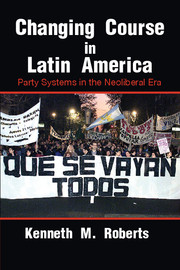Book contents
- Frontmatter
- Dedication
- Epigraph
- Contents
- List of Figures
- List of Tables
- Preface and Acknowledgments
- List of Abbreviations
- 1 Introduction: Party System Change in the Neoliberal Era
- Part I Explaining Regional Patterns
- Part II National Experiencesin Comparative Perspective
- 7 Critical Junctures in Elitist Party Systems
- 8 Critical Junctures in Labor-Mobilizing Party Systems
- 9 Aftermath: Reactive Sequences and Institutional Legacies
- 10 Conclusion: Political Legacies and the Crisis of Representation
- Appendix Election Results in Latin America
- References
- Index
9 - Aftermath: Reactive Sequences and Institutional Legacies
Published online by Cambridge University Press: 18 December 2014
- Frontmatter
- Dedication
- Epigraph
- Contents
- List of Figures
- List of Tables
- Preface and Acknowledgments
- List of Abbreviations
- 1 Introduction: Party System Change in the Neoliberal Era
- Part I Explaining Regional Patterns
- Part II National Experiencesin Comparative Perspective
- 7 Critical Junctures in Elitist Party Systems
- 8 Critical Junctures in Labor-Mobilizing Party Systems
- 9 Aftermath: Reactive Sequences and Institutional Legacies
- 10 Conclusion: Political Legacies and the Crisis of Representation
- Appendix Election Results in Latin America
- References
- Index
Summary
Critical junctures have lasting effects, but their institutional outcomes vary in their resiliency. That is especially true of critical junctures in party system development, where any given set of parties, or any competitive equilibrium among them, is at least potentially susceptible to the disruptive effects of elite and mass political behavior. Whether motivated by policy or office-seeking goals, the strategic behavior of political elites can destabilize a party system by altering its “supply side” through decisions to split, merge, or form new parties. Likewise, voters are free to alter their partisan preferences in response to changing conditions, preferences, issue saliencies, or performance records. A disillusioned electorate can always “throw the bums out” if it so chooses. To reproduce a competitive equilibrium thus requires that political entrepreneurs have incentives to join and remain in established party organizations, and that citizens be motivated to vote for them in relatively stable proportions.
Why, then, are the institutional outcomes and competitive equilibriums produced by some critical junctures more stable and resilient than others? Stability is not simply a function of institutional strength, as the divergent trajectories of party systems in Brazil and Venezuela amply demonstrate; it also matters how a critical juncture aligns competing political actors and positions them to respond to evolving societal pressures. Such alignments may even condition – in a path-dependent manner – the types and intensities of societal pressures that emerge, as well as their mode of political expression within or against established institutions. Reactive sequences in the aftermath period are thus likely to vary in their capacity to disrupt, transform, or reproduce the institutional outcomes of critical junctures themselves. Some outcomes may be reinforced or “locked in” by reactive sequences that they effectively channel, producing path-dependent institutional legacies; others may be transformed by reactive sequences that disrupt initial outcomes and produce longer-term institutional legacies that diverge sharply from them.
- Type
- Chapter
- Information
- Changing Course in Latin AmericaParty Systems in the Neoliberal Era, pp. 229 - 270Publisher: Cambridge University PressPrint publication year: 2015

